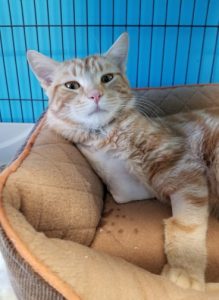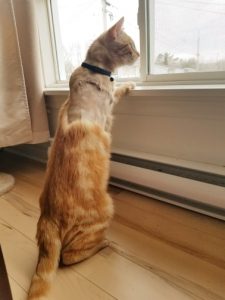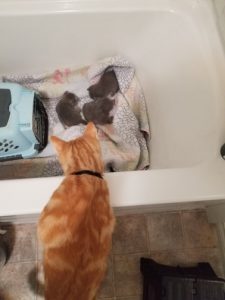All pets deserve love and attention. Pets with special needs require extra love and care, and include animals that are blind, deaf, have missing limbs, dietary/medical needs, chronic illness, allergies, or behavioral issues such as separation anxiety.
Special needs pets are not defined by their limitations. Although they require some dedicated care or training, they are no different in most respects from any other pet. Their challenges make them no less loving or lovable and they can adapt to their circumstances much better than you think. A three-legged pet will still run and play, while a deaf or blind pet will depend on other senses to navigate his home and interact with people.

Take Ron – a handsome 9-month old ginger tabby who was brought to the Kings SPCA with injuries to his front leg. At our SPCA Animal Hosptial, we determined that Ron’s leg was shattered – likely he had been hit by a car – and it was best for Ron to have his leg and shoulder amputated to prevent a lifetime of discomfort. Post-surgery Ron was on bed rest, pain meds and antibiotics for one week. He spent the next few days having supervised exercise time to help him adjust to his new body. Fully recovered from his operation, Ron was ready to find a loving home.
What do special pets like Ron need? Special guardians – people with big hearts willing to step up to give these animals a loving home and a second chance at the happiness they deserve. Enter Bryanna. For some time, Bryanna and her partner Kyle had been contemplating getting their seven-year-old cat, Guiness, another friend. “I’m a big believer that animals choose their guardians and that was what happened with Ron. I met him and fell in love even before I knew his story. The rest is history,” says Bryanna. Just like that, Ron was adopted!

Bryanna reports that Ron “handled his amputation like a champ” and adapted nicely to his new home. “He moved into our bedroom until fully healed before meeting his new brother. He eventually learned to navigate his new home. Things like learning how to do stairs again and using the litter box came with practice.” The lack of a leg hasn’t slowed Ron down. “He loves chasing toys and wrestling with his brothers (Ron usually wins!).”
Besides being full of love, Ron is full of surprises. “He’s a giant foodie,” states Bryanna “which isn’t very compatible with his need to maintain a healthy weight to prevent joint issues. Even with three legs, he’s a master of climbing counters, opening cupboards and even his Rubbermaid food tote. One night, Ron stole a bag of chips that was on top of the fridge, so we need to ensure we keep food out of reach! He also loves going for car rides, especially to our cabin in summer.”
“Our biggest surprise was how Ron took to caring for various kittens I have fostered,” says Bryanna. “Ron’s first foster baby was Melvin. Ron was more than happy to help Melvin learn what being a cat was all about.” In fact, Melvin is now Ron’s forever brother. “This summer, I fostered 5 orphaned kittens and ‘Mama Ron’ was a big help. He always ensured that everybody was cleaned up after feedings, provided much needed snuggles and taught the kittens good manners so they can grow up to be their best selves.”

“We are so proud of Ron’s accomplishments,” relates Bryanna. “He is an SPCA ambassador for educating the public about life with three legs. Just this week, Ron was at the shelter for a visit with 25 Sparks, helping the kids learn about animals with special needs and about the SPCA’s work.”
What advice would Bryanna give to people about adopting a special needs pet? Do your research. We have compiled some below for you to start! Be prepared for the commitment that comes with pet ownership. Know what you need to do to help your new family members adapt to their new life and know what to expect in the future. We see all types of special needs at the SPCA and most of the time, the solutions or changes needed are simple. I have seen leg amputations, eye removals, deafness, food allergies, senior animals and simply ones who are very shy or nervous. They have all found the perfect families for them and are now living their best lives.”
Please consider being special and adopting a special needs pet. If you can’t adopt, you can still help to give deserving animals like Ron a chance to live their best life. Please donate today!

Understanding the commitment involved in adopting a special needs pet is crucial to a happy healthy relationship. There are important things to consider before adopting a pet with special needs.
-
Think about any long-term dietary requirements, special medications or treatments your pet will need. Pets with behavioral issues may need special training; those with mobility challenges may need therapy or surgery. Ensure you can fit these costs into your family’s budget.
-
Your pet may need medications/injections at specific times of the day. Ensure you’re available to do this.
-
Talk with your family about the challenges that come with adopting a special needs pet and ensure everyone’s on board.
-
Your pet may need more frequent vet visits. Pets with an injury or physical disability may need assistance with standing or walking. Some may need you to physically accompany them outside for bathroom breaks, as opposed to simply being let out.
-
The Nova Scotia SPCA makes every effort to place special needs pets with their perfect human match. Before deciding to adopt, speak to shelter staff since they’re familiar with the animal and consult with your vet to get a good understanding of the pet’s ongoing requirements. Whatever the pet’s special needs, the SPCA will be there before and after adopting to support you by providing information and advice.
